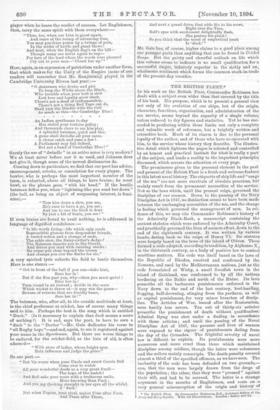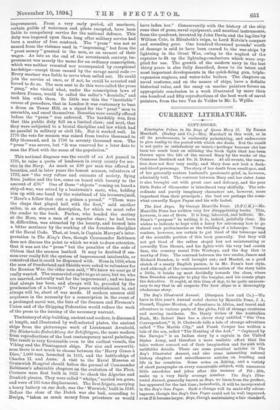THE BRITISH FLEET.*
IN his work on the British Fleet, Commander Robinson has dealt with a subject even wider than that covered by the title of his book. His purpose, which is to present a general view not only of the evolution of our ships, but of the origin, character, functions, organisation, and administration of the sea service, seems beyond the capacity of a single volume, unless reduced to dry figures and statistics. Yet he has suc- ceeded in producing within these limits not only a complete and valuable work of reference, but a brightly written and attractive book. Much of its charm is due to the personal loyalty of the author, and of those who have co-operated with him, to the service whose history they describe. The illustra- tive detail which lightens the pages is selected and controlled by an honest and practical instinct for what is really a part of the subject, and lends a reality to the important principles discussed, which arrests the attention at every page.
The prominence given to the personal element in the past and present of the British Fleet is a fresh and welcome feature in this latest naval history. The etiquette of ship life and "usage of the sea" are not mere survivals of obsolete practices, but mainly result from the permanent necessities of the service. Not so the laws which, until the present reign, governed the discipline of our seamen. Down to the passing of the Navy Discipline Act in 1847, no distinction seems to have been made between the unchanging necessities of the sea, and the change in feeling which governed the management of men. In evi- dence of this, we may cite Commander Robinson's history of the Admiralty Black-Book, a manuscript containing the ancient statutes which were enforced by the Admiralty Court, and practically governed the lives of seamen afloat, down to the end of the eighteenth century. It was written by various hands, dating back to the reign of Henry VI. Its statutes were largely based on the laws of the island of Oloron. These formed a code adopted, according to tradition, by Alphonse X., in the thirteenth century, as a body of positive law to control maritime matters. His code was itself based on the laws of the Republic of Rhodes, received and confirmed by the Romans, and used by the Mediterranean nations, just as the code formulated at Wisby, a small Swedish town in the island of Gothland, was conformed to by all the nations bordering on the Baltic and north of the Rhine. Its laws prescribe all the barbarous punishments enforced in the Navy down to the end of the last century, keel-hauling, flogging, half-drowning, slinging from the yardarm, as well as capital punishment, for very minor breaches of discip- line. The Articles of War, issued after the Restoration, were hardly less severe. Ten out of thirty-six articles prescribe the punishment of death without qualification. Admiral Byng was shot under a finding in accordance with these articles ; and until the passing of the Naval Discipline Act of 1847, the persons and lives of seamen were exposed to the rigour of punishments dating from the day of the Crusades. The frightful severity of naval law is difficult to explain. Its punishments were more numerous and more cruel than those which maintained discipline among soldiers, though the latter were volunteers and the sailors mainly conscripts. The death-penalty covered almost a third of the specified offences, as we have seen. The barbarity of the code has been defended on two grounds,— one, that the men were largely drawn from the dregs of the population ; the other, that they were " pressed " against their will, and had to be coerced. The latter is a strange argument in the mouths of Englishmen, and rests on a very general misconception of the origin and history of * The British Fleet. By Commander Robinson, MN., Assistant-Bditor of the Army and Navy Gasette. Vith 15U Illustrations. London : Seeley and 00
impressment. From a very early period, all mariners, certain guilds of watermen and pilots excepted, have been liable to compulsory service for the national defence. This duty was imposed upon them long after military service had been a matter of free contract. The " press " was not so named from the violence used in "impressing," but from the " prest money" granted to the men, as an earnest of their wages. As late as the end of the seventeenth century, im- pressment was merely the name for an ordinary conscription, which was neither resented nor accompanied by exceptional hardships—except those caused by the savage naval code :— Every mariner was liable to serve when called out. He could join the service at once, or if not, he could be arrested and forced to do so. The men sent to do this were called the press "gang," who visited what, under the conscription laws of modern France, would be called the sailor's "domicile," and took him with them. So little was this the " inevitable " course of procedure, that in London it was customary to beat a drum on Tower Hill, as a signal for the " prest" men to assemble, and enrol themselves. Bounties were usually offered before the " press " was enforced. The hardship was, first that this public duty fell on a limited class ; and next, that they were subjected to a brutal discipline and law which had no parallel in military or civil life. But it worked well. In 1776 the vote for seamen was raised from twelve thousand to fifty thousand, and in 1790 to seventy thousand men. The " press " was severe, but "it was reserved for a later date to man the Fleet with the scum of the population."
This national disgrace was the result of an Act passed in 1795, to raise a quota of landsmen in every county for ser- vice in the Navy. As much as 230 per man was offered in bounties, and in later years the honest seamen, volunteers of 1793, saw "the very refuse and outcasts of society, flying from justice and the law, come on board with bounty to the amount of 270." One of these " objects " coming on board a ship-of-war, was seized by a boatswain's mate, who, holding him up with one hand by the waistband of his trousers,[said, "Here's a fellow that cost a guinea a pound." "Them were the chaps that played hell with the fleet," said another sailor, in an eloquent description, for which we must refer the reader to the book. Parker, who headed the mutiny at the Nore, was a man of a superior class ; he had been in difficulties, was attracted by the bounty, and turned into a bitter mutineer by the working of the ferocious discipline of the Naval Code. That, at least, is Captain Marryat's inter- pretation in The King's Own, though Commander Robinson does not discuss the point to which we wish to draw attention, that it was not the " press " but the penalties of the code of Oleron that the seamen loathed, It may be doubted if sea- men ever really felt the system of impressment intolerable, or conceived that it could be dispensed with. Even in 1856, when the men of Sunderland and Shields were asked to volunteer for the Russian War, the older men said, "We know we must go if really wanted. The unmarried ought to go at once, but we, who are married, naturally wait for the impressment ; and we know that always has been, and always will be, preceded by the proclamation of a bounty." Our peace establishment is, and always will be, short of war needs. If modern seamen still acquiesce in the necessity for a conscription in the event of a prolonged naval war, the lists of the Seamen and Firemen's Union and of the Shipping Federation would reduce the work of the press to the issuing of the necessary warrant.
The historyof ship-building, ancient and modern, is discussed at length, and illustrated by well-selected plates, the ancient ships from the picturesque work of Lieutenant Arenhold, Die Historische Entwichlung der Schlifstypen, the more modern from reproductions of the best contemporary naval paintings. The result is very favourable even to the earliest vessels, the Viking and the Plantaganet ships. For size and seaworthi- ness there is not much to choose between the Harry Grace Dieu,' 1,000 tone, launched in 1515, and the battle-ships of Charles H. and Anne. A visit to the Naval Museum at Greenwich Hospital should follow the perusal of Commander Robinson's admirable chapters on the evolution of the Fleet. Cruisers were first built in 1625 to check the Algerine and Dunkirk pirates. They were called " whelps," carried ten guns, and were of 185 tons displacement. The first frigate, carrying a heavy battery on one deck, was the Warwick,' built in 1649. Before the close of the Dutch war she had, according to Evelyn, "taken as much money from privateers as would
have laden her." Concurrently with the history of the ship runs that of guns, naval equipment, and nautical instruments, from the quadrant, invented by John Davis, and the log-line by William Cole, in Elizabeth's reign, to Lord Kelvin's compass and sounding gear. One hundred thousand pounds' worth of damage is said to have been caused to the war-ships by lightning in the Great War, owing to the neglect of the captains to fit up the lightning-conductors which were sup- plied for use. The growth of the modern navy in the last thirty years is also fully described, down to its latest and most important developments in the quick-firing gun, triple.. expansion engines, and water-tube boilers. The chapters on naval costume, and on the names of ships, have a definite historical value, and the essay on marine painters forms an appropriate conclusion to a work illustrated by more than one hundred and fifty reproductions of the best work of naval painters, from the two Van de Yeldes to Mr. L. Wyllie.







































 Previous page
Previous page